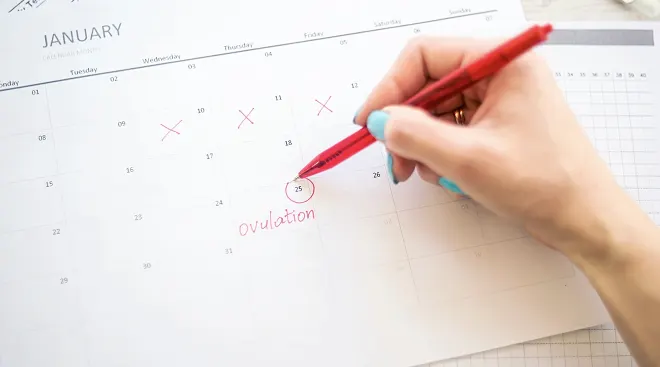8 Shocking Facts About Trying to Get Pregnant
1. You’re losing eggs every minute of every day.
Not to put the pressure on, but when it comes to making a baby, time is seriously of the essence. Anate Aelion Brauer MD, MS, FACOG, a physician at the Greenwich Fertility and IVF Center, says that when a woman’s in her early 30s, it’s not just her egg count that doctors are worried about. “Starting in your 30s, which is the time most people plan to start their family, not only do your egg numbers start to decline, but the quality of your eggs is aging too,” she says. So what does that mean? Brauer says that the older you get, the more genetic abnormalities and DNA damage your eggs are likely to have. To put it into perspective, she says that egg abnormalities in a 30-year-old woman will be about 30 percent; when she’s 35, they’ll be at 40 percent, and a for a 40 year old, greater than 90 percent of her eggs will be abnormal. “But that’s not scare women who are trying to get pregnant,” Brauer says. “It’s just important to know the statistics.”
2. It’s going to take longer than you think to get pregnant — a lot longer.
“In a totally healthy couple at the peak of their fertility,” says Brauer, who’s also an assistant professor at the NYU School of Medicine, “chances per month of conceiving are only about 20 percent — which is really low.” Luckily, your odds of getting pregnant won’t always stay that low. “For couples who have been trying for six months, they have a 60 percent chance of conception. And for couples who’ve been trying for a year, there’s a 90 percent chance of getting pregnant.”
3. You can still get pregnant on the pill (or any other form of prevention).
Brauer says that it’s not totally impossible to get pregnant when you’re on the pill — and if you’re using a seven-day placebo, your chances of getting pregnant increase even more. Why? “It’s called ‘escape ovulation,’” she says, “and when you’re on a seven-day placebo, your body is still making an egg and ovulating, which means you can get pregnant, even when you’re not trying to.”
If you miss two-to-three days of you taking your pill, that also gives your body enough time for your ovaries to start making a new egg, Brauer adds. And the same goes for an IUD. There have been instances where intercourse has actually pushed a woman’s IUD out of the way.
4. Your home pregnancy test might say you’re not pregnant, but you probably are.
“The trouble with home pregnancy tests is that they’re not always as sensitive as they claim to be,” Brauer says. “So if you get a negative read, it doesn’t necessarily mean you’re not pregnant.” If you feel pregnant (and you’re showing symptoms), then you should schedule an appointment with your doctor to confirm that what you’re feeling is really pregnancy-related. They’ll draw blood and run tests to determine whether or not you’ve really got a baby on board. So don’t give up after the first test.
5. You can get pregnant — up to three days later.
It’s not like you only have a 24-hour time period to get pregnant after intercourse. “Sperm can live in your uterus for up to 72 hours, and your eggs are actually viable for 24 hours,” says Brauer. But don’t go reaching for that pregnancy test the minute sex is over; it’s too early to tell if you’re pregnant or not. Just because your part of the puzzle is done (the babymaking!) doesn’t mean everyone else takes a break too — in fact, their job is just starting.
6. Lube is really the enemy.
We know a little extra lubrication is a nice touch sometimes, but when the goal is getting pregnant, it’s better off you stick to babymaking au naturale. Why? Brauer says that most (not all) of the lubricants on the market actually make it really difficult for sperm to swim through and make it through your cervix. It’s better to just err on the side of caution and do without.
7. Miscarriages are more common than you think — it’s just that no one talks about it.
“About 30 percent of all pregnancies end in miscarriage,” says Brauer, “and the reason it’s so shocking to everyone is because no one is talking about.” When she meets with a patient who’s suffered a miscarriage, she suggests they talk to friends who are parents or are currently pregnant because, chances are, they’ve experienced a miscarriage as well. “The most important thing to remember is that it’s not something you did wrong,” Brauer adds. “Sometimes, it just happens — and it’s happening to 30 percent of all pregnancies, so you shouldn’t feel alone.” The numbers don’t lie, so neither should you.
8. Spotting is okay — and common!
That little spot of blood you noticed when you were in the bathroom? It doesn’t always mean you’ve started your period (or that you’re not pregnant). “There are plenty of pregnancies that have spotting and bleeding in early pregnancy and it’s completely normal,” says Brauer. Just because you’re spotting or bleeding doesn’t mean you’re doomed or that things are wrong. In fact, in some cases, it may be implantation-related, which is a good thing when you’re trying to get pregnant. But if it persists, call your doctor. They’ll be able to take a closer look and tell you if it’s normal — or something you should worry about.
Please note: The Bump and the materials and information it contains are not intended to, and do not constitute, medical or other health advice or diagnosis and should not be used as such. You should always consult with a qualified physician or health professional about your specific circumstances.
Plus, More from The Bump:
Navigate forward to interact with the calendar and select a date. Press the question mark key to get the keyboard shortcuts for changing dates.




















































